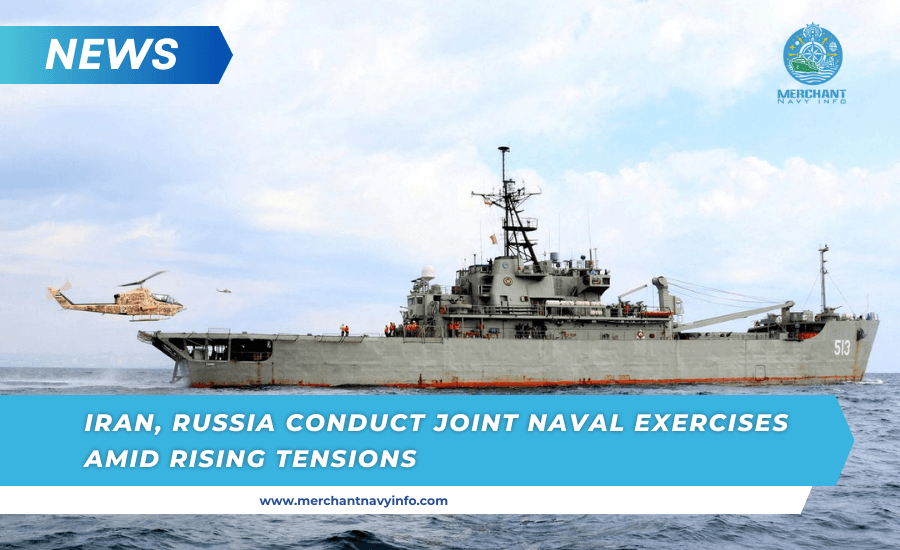
Iran And Russia Launch Naval Exercises In High-Risk Triangle Of Maritime Coercion As Tensions Rise
Iran has held naval exercises in the Indian Ocean, with Russia and Oman also participating, amid rising tensions in the Gulf. The IMEX 2024 exercise kicked off today with nine other countries participating, marking a coming together of regional and global powers interested in the strategic waterway of the Middle East.
According to Iranian state TV, the exercise claims to be a show of goodwill and ability to protect peace. However, IMEX 2024 is more than just a routine military exercise; it is a strategic move to bring together NATO’s two most powerful adversaries.
“The exercise will strengthen collective security in the region, expand multilateral cooperation, and demonstrate goodwill and ability to protect peace, friendship and maritime security,” the English-language news channel said. The claim is absurd given the current context: Iran and Israel are exchanging missiles, Iranian-backed Houthi rebels are disrupting trade in the Red Sea, and Russia is targeting ports and ships in the Black Sea.
The activities highlight the countries’ intention to be more assertive in securing key sea lanes vital to global trade.
The naval exercise follows previous Iranian naval exercises. In March, Iran, China, and Russia held their fifth joint naval exercise in the Gulf of Oman. The cooperation signals strengthening military ties to counter regional tensions and external pressures – particularly from the United States. The growing military cooperation between Iran, Russia, and China is a strategic step in enhancing their defense capabilities and asserting their regional influence.
Most recently, the Iranian Army and the Islamic Revolutionary Guard Corps held their largest joint naval exercises last month in the country’s southern waters. The exercises involved a fleet of 580 ships sailing in the Persian Gulf and the Strait of Hormuz, including warships and ocean-going destroyers. The parade was part of a week-long series of events commemorating the Iran-Iraq War of the 1980s.
The timing of IMEX 2024 is particularly significant as it coincides with an escalation in conflict in the Middle East. Israel’s war with Hamas in Gaza has intensified and spread, raising concerns about a wider regional confrontation. In addition, Iran-backed Houthi rebels in Yemen continue to attack merchant ships and NATO warships in the Red Sea, threatening one of the world’s most important sea lanes. This week, the United States retaliated against Yemen with B-2 stealth bombers.
The international community reacted cautiously to the exercises. While countries have a sovereign right to conduct military exercises, cooperation between Iran and Russia is closely watched by world powers, wary of any shift in the balance of power.
Geopolitical undercurrents in the Indian Ocean
Children walk through an exhibition commemorating the 75th anniversary of the founding of the Chinese Navy during a media open house tour of the People’s Liberation Army Navy Submarine Academy ahead of the 75th anniversary of the founding of the Navy in Qingdao, Shandong Province. China April 21, 2024. Reuters/Florence Lu
The northwest Indian Ocean has become a focal point for global power dynamics, with countries seeking to expand their influence. China’s establishing a naval base in Djibouti, a strategic location close to the Red Sea and the Gulf of Aden, illustrates this trend. The base enables China to project regional power and protect its maritime interests on important trade routes.
The latest developments in the Chagos Archipelago further highlight the region’s complexity. The British government initially agreed to cede sovereignty over the Chagos Archipelago to Mauritius, sparking strategic concerns. The archipelago, which includes Diego Garcia, home to a key US military base, holds enormous geopolitical value.
While the agreement is intended to correct historical injustices, security analysts warn that China’s growing influence in Mauritius could pose a maritime challenge near the US naval base at Diego Garcia. Given the strong trade relationship between Mauritius and Beijing, there are concerns that China could have easy access near the US base, which could complicate the security situation.
“Ceding sovereignty in the Indo-Pacific to Mauritius would do nothing to benefit the Chagossian people and would be a major strategic mistake for the UK and its allies,” Dr Emma Salisbury wrote in a recent report for the Geostrategic Commission. “The Chinese have been seeking to expand their network of overseas bases in the region for some time, and friendly relations between Mauritius and Taiwan remain.”









